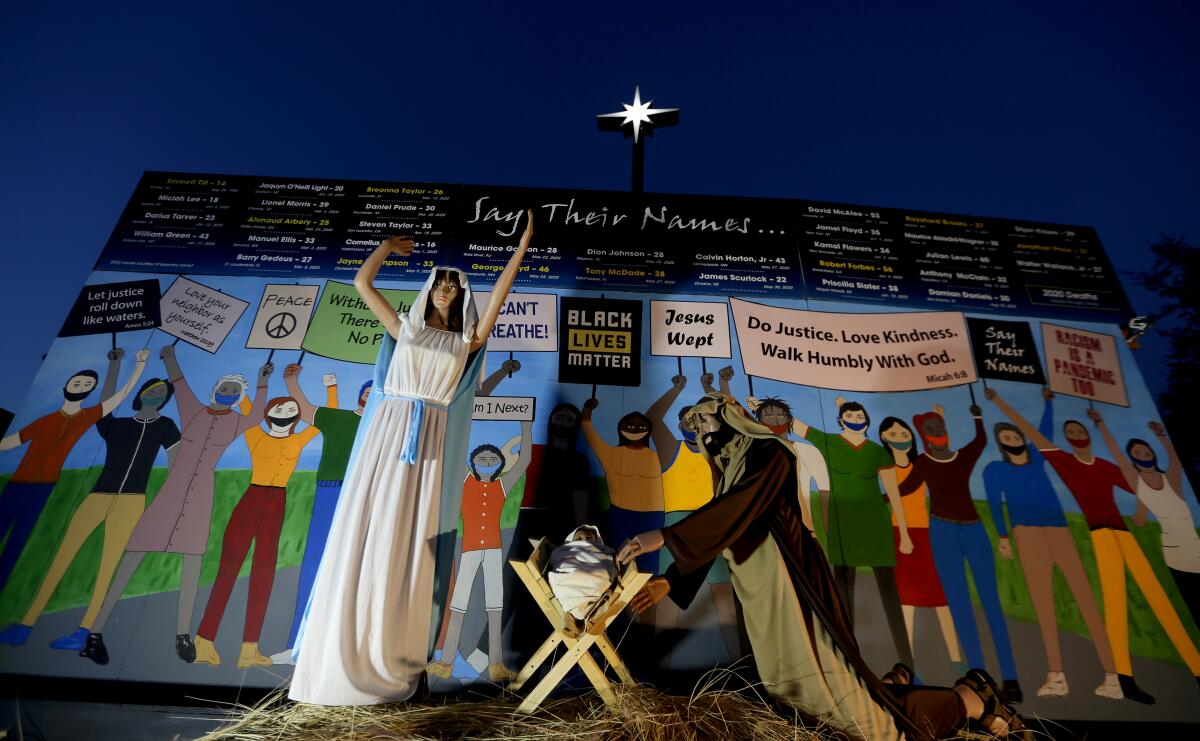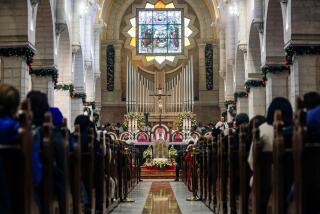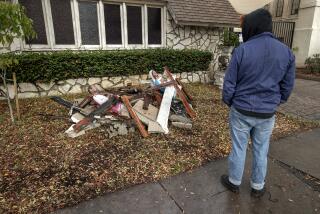Claremont church depicts Black Lives Matter protest in Nativity scene

According to the Bible, Jesus’ birth was a crowded affair — Mary and Joseph, a menagerie of animals and some shepherd visitors. But protesters?
Claremont United Methodist Church, in keeping with its tradition of eye-catching Nativity scenes, situated the Holy Family this year in front of a painting of masked people holding signs reading “I can’t breathe!” and “Black Lives Matter,” alongside Bible verses and other quotes.
“We couldn’t think of any other issue that we wanted to keep under the light of the Bethlehem star than the need to address racism,” said the Rev. Karen Clark Ristine, the church’s senior minister.
Against the mural backdrop, a statue of Joseph kneels beside the babe in a manger. Mary stands, her arms lifted with the protesters in the painting, alluding to the protests that erupted this summer after a Minneapolis police officer killed George Floyd. Above their heads, a banner lists the names of more than 30 Black people who have been killed, including Emmett Till, Breonna Taylor and Ahmaud Arbery.
“We affirm and join the call for justice and equity by the Black Lives Matter movement to ensure that Black lives matter as much as any other life,” reads a theological statement accompanying the exhibit. “Our faith in Christ challenges us to stand with Mary in her call for justice for the poor, the marginalized and the oppressed.”
The church has made a Christmas tradition of erecting Nativity scenes tied to the issues of the day. A few years ago, Mary was huddled in a sleeping bag, sitting at a bus stop beside her shopping cart and holding a baby — a modern depiction of Jesus’ family as homeless.
Another year, a hooded and bloody re-creation of Trayvon Martin, the 17-year-old shot and killed by George Zimmerman in 2012, knelt beside a silhouette of the virgin mother. Last year, the church placed each member of the Holy Family in cages, to represent families separated and detained behind fences at the U.S.-Mexico border.
“We don’t want the need for continuing conversation of racism and white supremacy to get lost in news cycles,” Ristine said. “This is a centuries-old issue that we need to keep wrestling with.”
The work is borne out by the church’s “Creative Peacemaking” committee, which begins mulling over ideas for the Advent season in March, said Genaro Cordova, the church’s facilities engineer who constructed the set. The possibilities for 2020’s Nativity statement were seemingly endless, but Cordova said the choice was obvious.
“We thought that racism was really worse, the worst epidemic that maybe we had around the world,” Cordova said. “COVID is going to pass, but the struggle [of] our brothers and sisters, Black Americans, is going to continue for a long time.”
Though COVID-19 was not the purpose of the scene, the painted people nonetheless wore masks. The summer’s protests couldn’t be untangled from the raging pandemic, Ristine said. Many of the church’s 430 members didn’t attend the protests because their age or health conditions put them at high risk for contracting the coronavirus, she said, so the Nativity scene was their way to join the discussion.
“This faith community kind of leads with justice,” said Ristine, who came to the congregation less than two years ago. “This is a very important public art statement for them every year.”
Cordova spent two months working on the project, meticulously choosing a bright color palette to paint the crowd, which he said is intended to represent the diversity of races at this summer’s protests.
“They were people from all over the spectrum, so it was nice that, white, brown, Asian, all kinds of people were supporting our Black brothers [and] sisters,” said Cordova, who attended a couple of protests this summer. “Even our Nativity scene, like Mary and Joseph and Jesus, they are not really white, but we tried to make it like brown, between all the races.”
The church’s Nativity scene is not only a Christmas hallmark, but also a public art installation subject to people’s interpretations, Ristine said. As with past Nativity scenes, she said responses this year have been “50/50.”
“I’m disappointed that you put such a volatile thing up on a manger scene,” one person said in a voicemail left in the church’s inbox.
Another caller said the scene brought tears to his eyes: “Thank you for ... keeping those names in the front line so that everybody remembers.”
Although the set was installed at the beginning of Advent in early December, as is the custom, the response has paled this year in comparison to last year’s thousands of responses, Ristine said. The pandemic probably has played a part: Fewer people are visiting the church property since it closed for in-person services in March.
More to Read
Sign up for Essential California
The most important California stories and recommendations in your inbox every morning.
You may occasionally receive promotional content from the Los Angeles Times.











